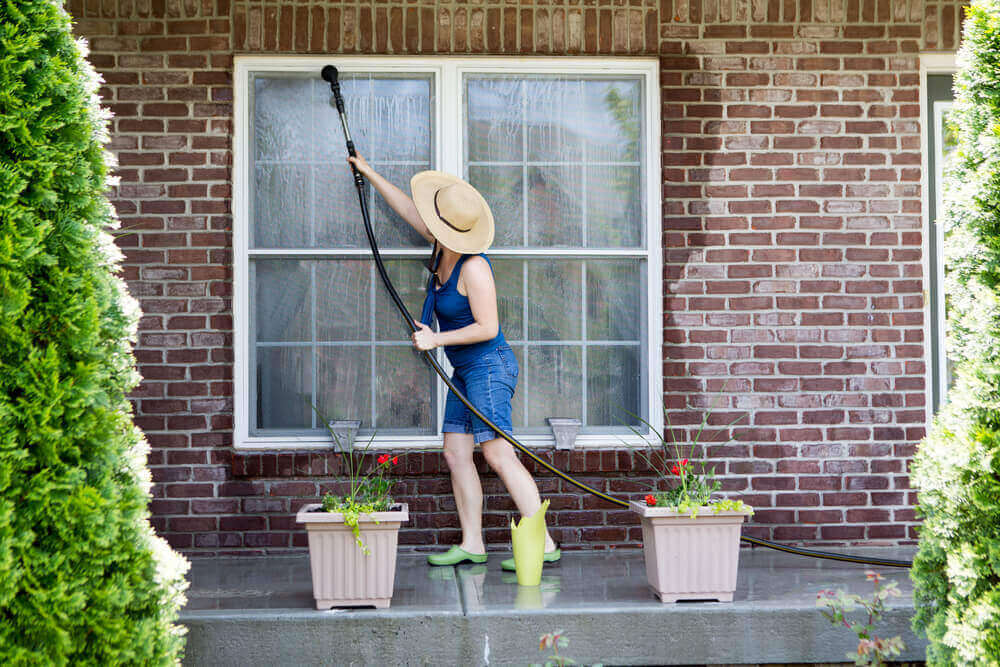Brick exteriors can look great. Unfortunately, when brick isn’t maintained over time, it quickly loses its appeal.
Whether you have a brick fence, brick walls, brick walkways, or any other type of brick exteriors, it’s helpful to learn how to clean and restore brick. Find out everything you need to know about cleaning and restoring brick today.
Step-by-Step Guide to Cleaning Brick Outdoors
Step 1) Check the Weather Forecast
The best time to clean brick is when it’s around 50 degrees. Ideally, it will be cloudy. If it’s too hot or sunny, then cleaning solvents could dry too quickly and leave residue stains, discoloring your brick.
Step 2) Use a Tarp to Hide Nearby Surfaces
The liquid you use to clean brick could damage other surfaces – including metal, wood, and glass. Use a tarp or other covering to protect these surfaces. If you have lights, windows, or plants on the exterior of your home, for example, then you may want to cover up these items to protect from the cleaning solvents.
Step 3) Wet the Brick
Dry brick will absorb the solvent quickly, leaving you with discolored brick material and insufficient amounts of solvent. Spray the brick down thoroughly with a garden hose before you apply solvent.
You should also use your garden hose to remove any surface dirt and grime from the brick. You’ll want any major problems to be removed from the brick before moving onto the next step.
Step 4) Create your Cleaning Solvent and Apply
There are three effective types of cleaning solvents for brick, including soapy water (for general brick cleaning), a bleach formula (for mold and mildew), or muriatic acid (for the toughest-to-remove stains).
Soap (For Basic or Interior Cleaning): A basic soap mixture (say, with dish soap and warm water) can clean basic stains off of brick. If you don’t want to use bleach, then soap and warm water may be enough – especially if you live in a dry climate.
Vinegar (For Basic or Interior Cleaning): Alternatively, some people skip the dish soap and mix a solution with equal parts vinegar and water, then pour it into a spray bottle. This solution can be surprisingly effective at removing basic stains from brick.
Bleach (For Mold, Mildew, and Moss): A bleach mixture is ideal for removing mold, mildew, and moss from exterior brick walls. Combine a tablespoon of bleach with a gallon of warm water in a bucket, then apply the bleach with a sponge to the brick. Use a scrub to tackle hard-to-reach areas or difficult stains. If the bleach begins to dry on the brick, spray a small amount of water on the area to keep it moist. Once the surface has been cleaned, hose down the section of brick using water.
Muriatic Acid (For Rust, Soil, and Mortar Stains): Muriatic acid is an industrial-strength solvent that can easily remove tough stains caused by rust, soil, or mortar. You’ll need to wear full safety gear (rubber gloves, safety glasses, and a respirator) to create your muriatic acid formula. Fill a large bucket with a gallon of warm water, then add 1.5 cups of muriatic acid (you must pour the acid into the water; never pour water into the acid). Dip a brush into the acid, then apply the solution to brick using a bristle brush. Scrub gently, letting the acid remain on the brick for a few minutes. Rinse the acid off completely with a hose and ordinary water.
Step 5) Use a Pressure Washer
Pressure washers are great at cleaning brick surfaces. You can add a brick-cleaning solution to your pressure washer. Or, you can use water to clean the brick thoroughly after applying the cleaning solution in Step 4.
Too much pressure can damage the brick. Keep the pressure around 3,000 pounds per square inch to avoid damaging the brick.
Other Tips for Cleaning Brick Exteriors
- If a certain side of your home doesn’t get much sunlight, then mold, mildew, and moss can quickly form on the bricks.
- A good sponge should easily clean the surface of the brick; however, for harder-to-reach areas, like the spaces between bricks, use a natural or nylon-bristle scrub brush.
- Avoid using a wire brush because it can leave bits of metal behind that rust and stain your bricks.
- Avoid using the high-pressure setting on pressure washers if brick is loose or decaying, as it can cause significant damage to the brick. The ideal pressure when pressure washing brick is around 3,000 PSI.
Consider Hiring Professional Cleaners for Safe, Effective Brick Cleaning
Cleaning brick exteriors can be tricky. Professional exterior cleaning companies know what works on brick on your area – and what does not.
If you have never pressure washed brick before, then you may inadvertently damage your brick exteriors. A pressure washing company, meanwhile, will know the exact type of pressure to use on your brick.
Call Majestic Windows and Exterior Cleaning to schedule professional pressure washing in
Wantagh,
Massapequa,
Seaford and nearby cities.

